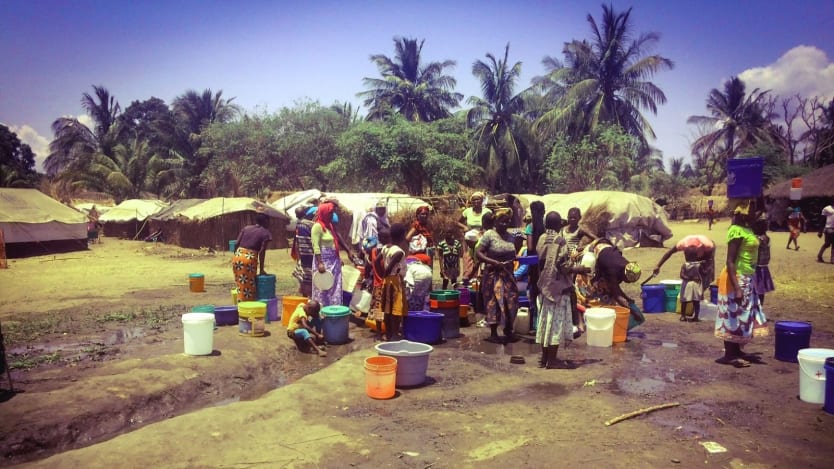
NAIROBI — In Mozambique’s northern province of Cabo Delgado, insurgents have attacked villages, burned homes, and gruesomely killed civilians. This month, the armed group beheaded and dismembered more than 50 people at a football field.
An uptick in violence is driving massive displacement into neighboring provinces. There are now more than 355,000 displaced people — four times the amount displaced earlier this year. The International Organization for Migration reported Tuesday that over 33,000 people fled violence in just the previous week. About 712,000 people are in need of humanitarian aid.
Humanitarian workers are struggling to meet the needs of displaced people, with limited funding and strained access because of security risks. This is expected to worsen when the rainy season starts next month.
“The big challenge right now is around humanitarian access,” said Marc Nosbach, country director for CARE International. “There is very limited activity in the areas where there is the active conflict. A lot of the work that humanitarian organizations are doing is on the periphery.”
A key need is shelter, according to aid groups, with many people cobbling together basic structures with local materials and receiving some plastic sheeting for rooftops from aid groups. Many are also living within host communities. There are hopes the government will provide people with more permanent land but there are challenges around funding to support this relocation, responders said.
Many people also need clean water, sanitation services, food, and mental health services as people process the horrors they’ve witnessed.
Rains threaten already limited access
Since 2017, Mozambique’s security forces have clashed with the armed fighters, who have claimed allegiance to the Islamic State. Over 2,340 people have died from the violence.
As violence surged this year, humanitarians have largely only had access to people who escaped the conflict areas.
“We know that a lot of people are still living in the bush and we don't have access to them. They are moving from one place to another place trying to avoid being caught by the insurgents and even killed,” said Alain Kassa, head of mission in Mozambique for Médecins Sans Frontières.
But the approaching rainy season could further limit access. The rains are expected to start in the coming weeks, lasting until April. Forecasts say there will be heavier rains than normal.
Many of the roads in the region are made of dirt, and could become inaccessible with the rains. Humanitarians could also lose access to bridges if they are flooded.
“This province is very difficult to move from one place to another during the floods,” Kassa said.
More on Mozambique:
► Mozambique's teenage pregnancy challenge
► The impact of Mozambique's cyclones on its HIV population
► Q&A: NGO director stresses need to rebuild a more resilient Mozambique
To reach people in hard-to-access areas, the World Food Programme has a plane that moves humanitarian teams around the province. It might need to expand these aviation operations during the rainy season, said Lola Castro, regional director for Southern Africa at WFP. It also uses barges to access coastal communities but the province experiences large tides that render the coast inaccessible for a large part of each day, she said.
People also use small boats to flee from the conflict. Between Oct.16 and Nov. 11, over 14,000 people arrived by boat on a beach in Pemba — the capital city of Cabo Delgado. In late October, there were 29 boats in one day. But these boats become more dangerous during the rainy season, Nosbach said. This month, one of the boats capsized, reportedly killing 40 people.
Cyclone aftermath and food insecurity
The province is also still reeling from the impacts of last year’s Cyclone Kenneth, the strongest cyclone to ever hit the African continent, which killed dozens and destroyed thousands of homes and over 135,000 acres of crops. It was the first cyclone to hit this far north in Mozambique and the landfall from the storm overlapped with the conflict zone.
Aid organizations initially had better access to support communities with the ongoing recovery from the cyclone, but this access is increasingly limited due to the violence, Nosbach said.
“The recovery that would have taken place in some of those areas has been overshadowed by the exodus of people from those areas,” Nosbach said.
The conflict is also putting additional pressure on the resources of communities that are still recovering from the storm, he said. Displaced populations have fled to Ibo Island, for example, which was in the direct path of the cyclone, because it’s now considered a safe haven.
There are concerns about intense cyclones hitting the country again next year. Cyclone season starts in February.
The cyclones and the conflict have also exacerbated food insecurity, in a province that already struggles with this issue. An estimated 52% of children under 5 in the province are moderately or severely stunted. There are issues around diet diversity and inadequate access to seed and fertilizer, Castro said. The soil in parts of the province is also sandy, limiting production. WFP is providing both food aid and cash vouchers to about 318,00 displaced people in the area, she said.
"The situation is very, very complex,” she said. “And we are trying to reach as many people as possible.”








